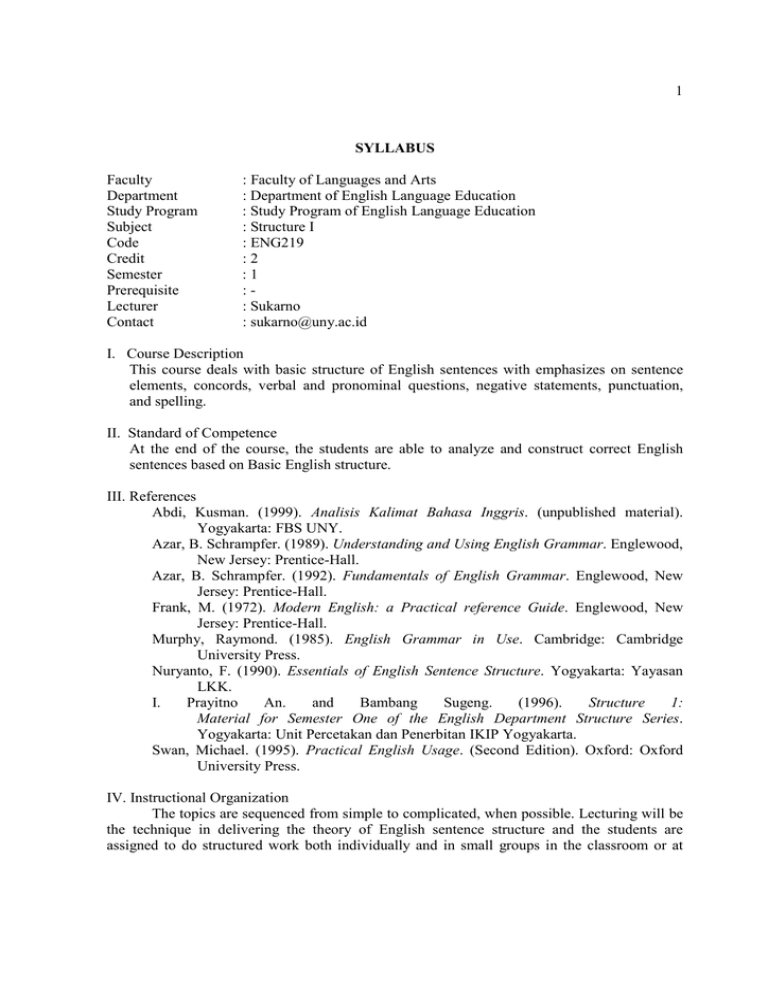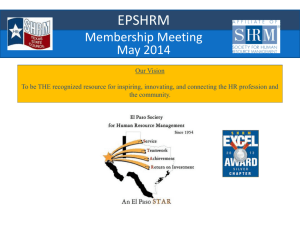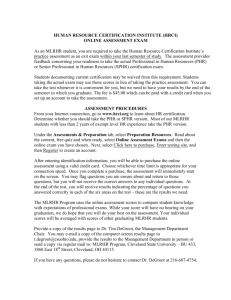1 Faculty : Faculty of Languages and Arts
advertisement

1 SYLLABUS Faculty Department Study Program Subject Code Credit Semester Prerequisite Lecturer Contact : Faculty of Languages and Arts : Department of English Language Education : Study Program of English Language Education : Structure I : ENG219 :2 :1 :: Sukarno : sukarno@uny.ac.id I. Course Description This course deals with basic structure of English sentences with emphasizes on sentence elements, concords, verbal and pronominal questions, negative statements, punctuation, and spelling. II. Standard of Competence At the end of the course, the students are able to analyze and construct correct English sentences based on Basic English structure. III. References Abdi, Kusman. (1999). Analisis Kalimat Bahasa Inggris. (unpublished material). Yogyakarta: FBS UNY. Azar, B. Schrampfer. (1989). Understanding and Using English Grammar. Englewood, New Jersey: Prentice-Hall. Azar, B. Schrampfer. (1992). Fundamentals of English Grammar. Englewood, New Jersey: Prentice-Hall. Frank, M. (1972). Modern English: a Practical reference Guide. Englewood, New Jersey: Prentice-Hall. Murphy, Raymond. (1985). English Grammar in Use. Cambridge: Cambridge University Press. Nuryanto, F. (1990). Essentials of English Sentence Structure. Yogyakarta: Yayasan LKK. I. Prayitno An. and Bambang Sugeng. (1996). Structure 1: Material for Semester One of the English Department Structure Series. Yogyakarta: Unit Percetakan dan Penerbitan IKIP Yogyakarta. Swan, Michael. (1995). Practical English Usage. (Second Edition). Oxford: Oxford University Press. IV. Instructional Organization The topics are sequenced from simple to complicated, when possible. Lecturing will be the technique in delivering the theory of English sentence structure and the students are assigned to do structured work both individually and in small groups in the classroom or at 2 home. Class discussion will be used to discuss students’ work. The progression of the course will be like the following. WEEK 1 I II III IV V VI VII BASIC COMPETENCE TOPIC ALLOTTED TIME 2 3 4 Defining a sentence Orientation and pre-test, The 2 X 50I difference between a sentence and a clause Analyzing sentence elements Sentence analysis (primary and 2 X 50I (primary and complementary complementary elements) elements) Identifying S & O (N/NE) N/NE: Pronoun 2 X 50I - Masculine-feminine Pronoun - Possessive Pronoun - Reflexive Pronoun Identifying S & O (N/NE) N/NE: Single 2 X 50I - USING NOUN - USING GERUND - USING TO INF. Identifying S & O (N/NE) N/NE: Phrase 2 X 50I - USING ARTICLES - USING NOUN PHR. - USING GRD. PHR. - USING TO INF. PHR. Identifying V/VG V/VG: 2 X 50I - USING Vt. - USING Vi. - USING Vl. Determining complementary Identifying adverb: 2 X 50I elements: Identifying Adverb - Single: USING N, To inf.,Phr., PRES PART, PAST PART, ADV, PREP. - Phrase: USING NP,To Inf.,Phr., Pres Phr., Past Part Phr., Adv. Phr., Prep. Phr. VIII Determining complementary elements: Identifying Complement Identifying complement: - Single: USING N, Pron., Gr., 2 X 50I To Inf., Adj., Prep., Pres. Part., Past Part., Bare Inf. - Phrase: USING NP., Gr. Phr., To Inf. Phr., Adj. Phr., Prep. Phr., Pres. Part. Phr., Past Part. Phr., Bare Inf. Phr. IX X Identifying finite/non-finite Finite and Non-finite V V Using tenses of Vs Tenses 2 X 50I 2 X 50I 3 XI Using concord between S&V 2 X 50I XII Constructing questions Constructing pronominal questions Constructing negative statements Identifying and using correct punctuation Identifying spelling 2 X 50I XIII XIV XV XVI Concord between S & V: Analyzing complete sentences verbal Verbal questions Pronominal questions: Analyzing complete sentences Negative statements: Analyzing complete sentences Punctuation 2 X 50I Spelling 2 X 50I 2 X 50I 2 X 50I V. Assessment Students’ learning achievement will be assessed by considering the following components and their contributions to the overall grade: A. Class performance : 10 % B. Structured work : 20 % C. Mid-semester test : 30 % D. Semester test : 40 % Yogyakarta, September 2010 Lecturer, Sukarno, S.Pd. NIP. 19760502 200501 1 001






